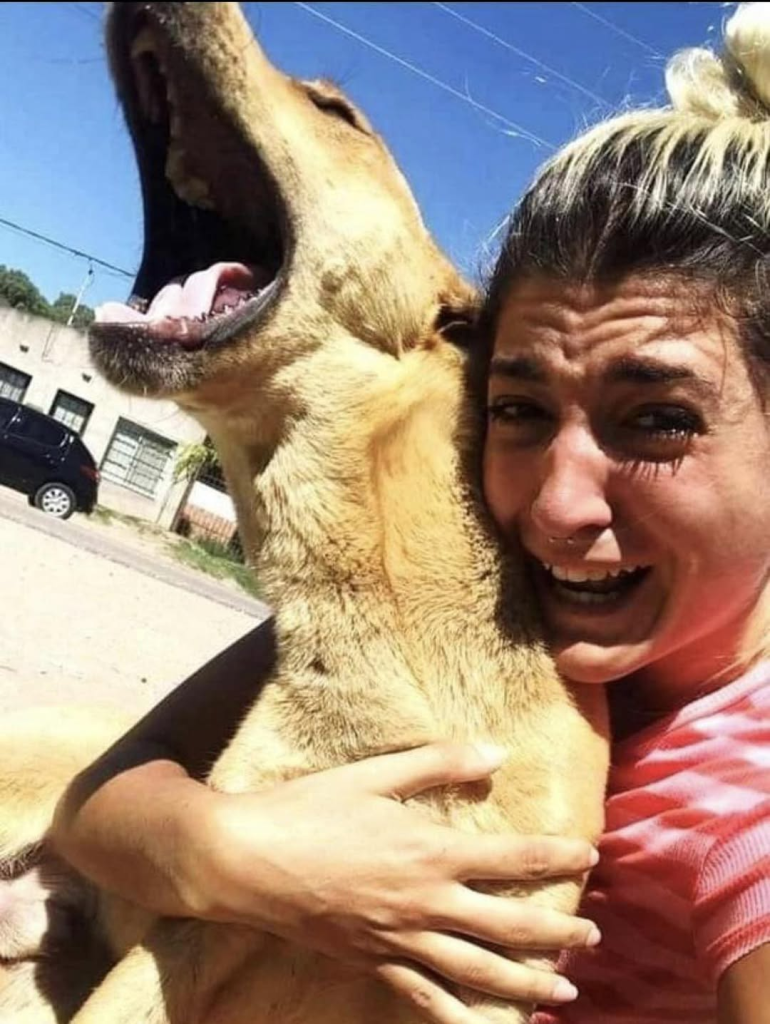When everything changed
For years, she had been living a comfortable, predictable life: waking each morning to soft sunlight, pouring coffee, exchanging greetings with neighbours, then heading off to a job that paid the bills and offered stability. Her pet dog — loyal, playful, endlessly affectionate — had been her steady companion in those routines. They had routines together: morning walks, lazy afternoons, shared evenings. The dog was more than an animal; he was part of her world.
But one ordinary morning, the world cracked. Without warning, her dog vanished. Gone. No trace, no sign, no clue. One moment, she was scratching behind his ears; the next, his collar lay on the floor, and her heart sank.
The moment of terror
At first she searched the house, calling his name, pressing her ear against doors, checking every corner. Nothing. The leash, the empty bed, the open door—all warnings she dismissed until the truth hit: this was no accidental escape. Someone had taken him.
That realisation unleashed panic. Not only had she lost a beloved friend, she had lost something that made her home feel like home. The emptiness echoed. She felt betrayed—by the world outside, by the careless moment she must have missed, by the idea that justice might not exist for a stolen dog.

The bold decision
What happened next surprised even her. Rather than return to her job as usual, she made a radical decision: she would stop work, drop the routine, suspend normal life, and launch a full‐scale search. She told her employer she needed time; the responses ranged from shock to concern. But she knew: she couldn’t wait. Every minute mattered.
Armed with flyers, social media posts, and a burning hope, she knocked on doors across the city, walked familiar neighbourhoods, retraced every path they’d ever walked together. She asked shopkeepers, questioned passersby, revisited old parks. She posted images of him under streetlights and cafe awnings. She made phone calls at midnight, posted updates by dawn.
The emotional toll
This wasn’t just a practical search. It was an emotional roller‐coaster. At times, she felt hope—when someone thought they’d seen a dog matching his description or when a neighbour sent a message. At other times, despair: dead ends, false leads, lonely hours sitting in her car at dusk, replaying his bark, his wagging tail, his bright eyes.
Her days blurred into nights. She lost track of time and even forgot small joys. She missed meals. She stopped conversing casually. The job she left behind felt distant. What mattered now was bringing him home.
The breakthroughs
And then came the breakthrough. A tip. A sighting. Someone said they’d seen a dog matching his description in a neighbourhood not far from where they lived. She drove there immediately. She walked the streets, calling his name, scanning faces, watching dogs walking by. The fear of being wrong was enormous. What if it was a mistake?
But then she saw him. His ears perked. He turned his head. Their eyes locked. She called his name softly, barely containing a cry. He hesitated. Then he rushed forward. The moment froze time.
Home at last
In her arms, he shivered—not from cold but from the journey they had been on. She held him tightly. Tears fell. Forgiveness came only later. First came safety. Then came questions: Where had he been? Who had him? What had he suffered? She couldn’t answer all of them. But she could focus on the fact that he was home.
Coming home was not that day’s end—it was only the beginning of healing. For him, for her. The job she left would eventually resume or perhaps change. The routines would rebuild. But nothing would ever go back to “normal” in the old way. Because they had crossed a line together: from comfort to crisis, from possession to devotion, from everyday life to warrior‐mode.
The lessons learned
She learned that love is not passive. That sometimes you must become relentless. That the things we consider “just part of life” — our pets, our routines, our jobs—are fragile. She learned about community: neighbours, strangers, social posts all became allies. She learned about courage: that quitting her job wasn’t giving up—it was redirecting her life to what mattered.
And perhaps most of all: she rediscovered what home means. It’s not just a place. It’s the feeling of belonging, safety, love. And with him back, it returned.
What now
Today, she walks again with him. Slow steps, quiet mornings. She smiles more freely. She sometimes glances at passers by who ask, “Is that your dog?” and she nods, as if confirming not just identity but survival. She still posts now and then about their walks, the sun on his fur, his playful leap into the autumn leaves. But the urgency has gone. For now.
She knows the risk of losing him again remains. But she also knows what she would do. And that gives her peace.